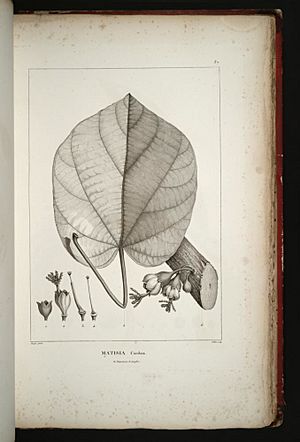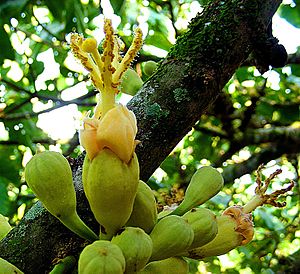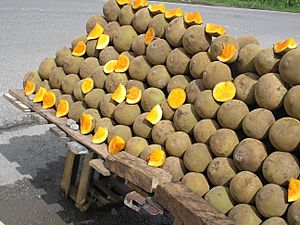South American sapote facts for kids
Quick facts for kids South American sapote |
|
|---|---|
 |
|
| Quararibea cordata, Illustration. | |
| Scientific classification |
|
| Kingdom: | Plantae |
| Clade: | Tracheophytes |
| Clade: | Angiosperms |
| Clade: | Eudicots |
| Clade: | Rosids |
| Order: | Malvales |
| Family: | Malvaceae |
| Genus: | Quararibea |
| Species: |
Q. cordata
|
| Binomial name | |
| Quararibea cordata |
|
| Script error: The function "autoWithCaption" does not exist. | |
| Synonyms | |
|
|
Script error: No such module "Check for conflicting parameters".
The Quararibea cordata, also known as the South American sapote or chupa-chupa, is a tall fruit tree. It can grow up to 45 meters (about 148 feet) high! This tree is native to the Amazon rainforest in countries like Brazil, Colombia, Ecuador, and Peru. It's called "semi-deciduous" because it loses some of its leaves during certain times of the year, but not all of them.
The chupa-chupa tree produces orange-yellow fruits. These fruits are soft, juicy, and sweet. Each fruit usually has 2 to 5 seeds inside. People often eat the fruit fresh, right out of their hand. You can also make juice from it. While many people enjoy the fruit, its quality can vary. Some trees might produce fruits that are not very flavorful or have too many fibers. This tree grows best in wet, deep soils, but too much water, like from floods, can harm it.
Where the Chupa-Chupa Tree Grows
The Quararibea cordata tree naturally grows in the foothills of the Andes mountains. It is common in parts of Brazil, Venezuela, and Colombia. However, it is not grown in many places around the world.
The chupa-chupa fruit has not become very famous outside of its native region. It is not widely planted in other countries. In 1964, a fruit expert from the US named Bill Whitman brought seeds from Peru. He planted a chupa-chupa tree in his garden in Florida, and it grew well and produced fruit there.
See also
 In Spanish: Chupa chupa para niños
In Spanish: Chupa chupa para niños
 | Selma Burke |
 | Pauline Powell Burns |
 | Frederick J. Brown |
 | Robert Blackburn |



